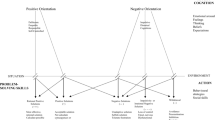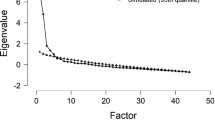Abstract
Recent research has emphasized the importance of interpersonal problems with depression. It has been hypothesized that deficits in interpersonal problem-solving skills may account for many of these problems. Three studies that examined the relationship between problem-solving skills and depression are reported. Problem-solving skills among children, adolescents, and adults were assessed by the Means-Ends Problem Solving Test. Contrary to prediction, there were no differences in problem-solving skills between depressed and nondepressed groups; these findings were consistent across each age group. The external validity of such paper-and-pencil measures of problem solving is questioned; it is suggested that future research focus on how depressed individuals solve real-life problems.
Similar content being viewed by others
References
Beck, A. T. (1972).Depression: Causes and treatment. Philadelphia: University of Pennsylvania.
Beck, A. T., Rush, A. J., Shaw, B. F., & Emery, G. (1979).Cognitive therapy of depression. New York: Guilford Press.
Butler, L., & Meichenbaum, D. (1981). The assessment of interpersonal problem-solving skills. In P. C. Kendall & S. D. Hollon (Eds.),Assessment strategies for cognitive-behavioral interventions. New York: Academic Press.
Carlson, G. A., & Cantwell, D. P. (1980). Unmasking masked depression in children and adolescents.Archives of General Psychiatry, 137 445–449.
Coyne, J. C. (1976). Toward an interactional description of depression.Psychiatry, 39 28–40.
Coyne, J. C., Aldwin, C., & Lazarus, R. S. (1981). Depression and coping in stressful episodes.Journal of Abnormal Psychology, 90 439–447.
Dempsey, P. (1964). A unidimensional depression scale for the MMPI.Journal of Consulting Psychology, 28 364–370.
Doerfler, L. A. (1981). Psychological research on depression: A methodological review.Clinical Psychology Review, 1 119–137.
Doerfler, L. A., & Richards, C. S. (1981). Self-initiated attempts to cope with depression.Cognitive Therapy and Research, 5 367–371.
Doerfler, L. A., & Richards, C. S. (1983). College women coping with depression.Behaviour Research and Therapy, 21 221–224.
D'Zurilla, T. J., & Nezu, A. (1982). Social problem solving in adults. In P. C. Kendall (Ed.),Advances in cognitive-behavioral research and therapy (Vol. 1). New York: Academic Press.
Gotlib, I. H., & Asarnow, R. F. (1979). Interpersonal and impersonal problem-solving skills in mildly and clinically depressed university students.Journal of Consulting and Clinical Psychology, 47 86–95.
Griest, D., Wells, K. C., & Forehand, R. (1979). An examination of predictors of maternal perceptions of maladjustment in clinic-referred children.Journal of Abnormal Psychology, 88 277–281.
Griffin, N. J., & Siegel, L. J. (1981, November).Cognitive indices of adolescent depression. Paper presented at the 15th annual meeting of the Association for Advancement of Behavior Therapy, Toronto.
Hatzenbuehler, L. C., Parpal, M., & Matthews, L. (1983). Classifying college students as depressed or nondepressed using the Beck Depression Inventory: An empirical analysis.Journal of Consulting and Clinical Psychology, 51 360–366.
Kaslow, N. J., & Rehm, L. P. (1983). Childhood depression. In R. J. Morris & T. R. Kratchowill (Eds.),The practice of child therapy. New York: Pergamon.
Kazdin, A. E. (1981). Assessment techniques for childhood depression.Journal of the American Academy of Child Psychiatry, 20 358–375.
Kazdin, A. E., & Petti, T. A. (1982). Self-report and interview measures of childhood and adolescent depression.Journal of Child Psychology and Psychiatry, 23 437–457.
Kovacs, M. (1981). Rating scales to assess depression in school-aged children.Acta Paedopsychiatrica, 46 305–315.
Landau, R. J., & Goldfried, M. R. (1981). The assessment of schemata: A unifying framework for cognitive, behavioral, and traditional assessment. In P. C. Kendall & S. D. Hollon (Eds.),Assessment strategies for cognitive behavioral interventions. New York: Academic Press.
Lewinsohn, P. M. (1974). Clinical and theoretical aspects of depression. In K. S. Calhoun, H. E. Adams, & K. M. Mitchell (Eds.),Innovative treatment methods in psychopathology. New York: Wiley.
Lewinsohn, P. M. (1975). The behavioral study and treatment of depression. In M. Hersen, P. M. Miller, & R. M. Eisler (Eds.),Progress in behavior modification (Vol. 1). New York: Academic Press.
McLean, P. (1976). Therapeutic decision-making in the behavioral treatment of depression. In P. O. Davidson (Ed.),The behavioral management of anxiety, depression and pain. New York: Brunner/Mazel.
Mullins, L. L., Siegel, L. J. (1981, November).Childhood depression, interpersonal cognitive problem solving, and life stress. Paper presented at the 15th annual meeting of the Association for Advancement of Behavior Therapy, Toronto.
Platt, J. J., & Spivack, G. (1973). Studies in problem-solving thinking of psychiatric patients.Proceedings of the 81st Annual Convention of the American Psychological Association, 8 461–462.
Platt. N. J., & Spivack, G. (1975).Manual for the means-ends problem-solving procedure (MEPS): A measure of interpersonal cognitive problem-solving skill. Unpublished manuscript, Hahneman Medical College and Hospital.
Shaw, B. F., & Dobson, K. S. (1981). Cognitive assessment of depression. In T. V. Merluzzi, C. R. Glass, & M. Genest (Eds.),Cognitive assessment. New York: Guilford Press.
Shure, M., & Spivack, G. (1972). Means-ends thinking, adjustment and social class among elementary school-aged childen.Journal of Consulting and Clinical Psychology, 38 348–353.
Siegel, J. M., Platt, J. J., & Peizer, S. B. (1976). Emotional and social real-life problem-solving thinking in adolescent and adult psychiatric patients.Journal of Clinical Psychology, 32 239–232.
Spivack, G., Platt, J. J., & Shure, M. B. (1976).The problem-solving approach to adjustment: A guide to research and intervention. San Francisco: Jossey-Bass.
Spivack, G., & Shure, M. B. (1974).Social adjustment of young children: A cognitive approach to solving real-life problems. San Francisco: Jossey-Bass.
Strober, M., Green, J., & Carlson, G. (1981). Utility of the Beck Depression Inventory with psychiatrically hospitalized adolescents.Journal of Consulting and Clinical Psychology, 49 482–483.
Teri, L. (1982a). Depression in adolescence: Its relationship to assertion and various aspects of self-image.Journal of Clinical Child Psychology, 11 101–106.
Teri, L. (1982b). The use of the Beck Depression Inventory with adolescents.Journal of Abnormal Child Psychology, 10 277–284.
Tesiny, E. P., & Lefkowitz, M. M. (1982). Childhood depression: A 6-month follow-up study.Journal of Consulting and Clinical Psychology, 50 778–780.
Weissman, M. S., & Paykel, E. S. (1974).The depressed woman: A study of social relationships. Chicago: University of Chicago Press.
Author information
Authors and Affiliations
Additional information
This paper is based, in part, on a doctoral dissertation by Leonard A. Doerfler conducted under the supervision of C. Steven Richards, and on master's theses by Larry L. Mullins and Nora J. Griffin conducted under the supervision of Lawrence J. Siegel.
Rights and permissions
About this article
Cite this article
Doerfler, L.A., Mullins, L.L., Griffin, N.J. et al. Problem-solving deficits in depressed children, adolescents, and adults. Cogn Ther Res 8, 489–499 (1984). https://doi.org/10.1007/BF01173286
Issue Date:
DOI: https://doi.org/10.1007/BF01173286




